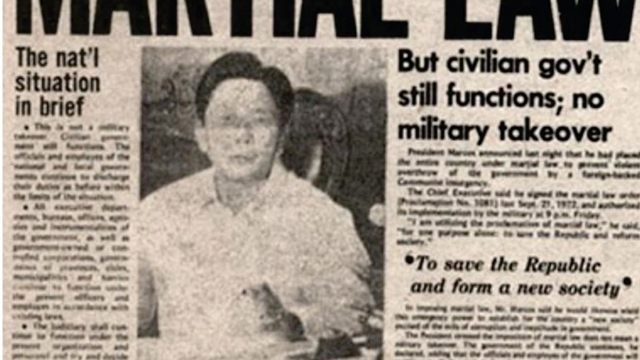SUMMARY
This is AI generated summarization, which may have errors. For context, always refer to the full article.

MANILA, Philippines – By simply signing a martial law decree on September 21, 1972, he kept his media critics silent for years.
If he ruled the Philippines today, however, the late dictator Ferdinand Marcos couldn’t have muzzled the press the same way. It is, after all, the age of social media, a free-for-all and relatively unrestricted means that has toppled dictatorships in the Middle East.
It is a tool that Filipinos now protect against supposedly new threats, such as a law that penalizes online libel.
A 21-year-old student when Marcos declared martial law 40 years ago, CNN Beijing bureau chief Jaime FlorCruz stressed the importance of Facebook and Twitter in an interview with Rappler. Social media was one thing his generation didn’t have when martial law gripped the Philippines for 9 years. (Watch more about martial law in the video below.)
“With the tools we have now, with the Internet, the social media networks, perhaps I think it will be harder now for a reimposition of a martial law rule. Why? Because information is better and more easily shared. It’s no longer a monopoly of the mainstream media,” FlorCruz said.
FlorCruz, a former student activist who stayed in China during the martial law years, said media generally plays a “unique and important role” in a country’s politics. “Therefore, the media should be kept free and robust, and it should be relevant. And by doing so, the media can play that role of preventing, averting any imposition of controls like martial law.”
The Philippines on Friday, September 21, marks the 40th year since Marcos imposed martial law. Filipinos remember the martial law period, from 1972 to 1981, for strict media regulation, human rights violations, and massive corruption by Marcos’ family and his cronies. (Read the full text of the martial law declaration below, courtesy of the Official Gazette)
Presidential Decree 1081: Martial Law
The popular People Power uprising in 1986 toppled Marcos and restored Philippine democracy.
New challenges
But is the government stifling free expression anew?
The same week that the country marked the anniversary of martial law, Filipino netizens began to protest the new Cybercrime Prevention Act of 2012. The law, which President Benigno Aquino III signed last September 12, punishes online libel using the definition in Article 355 of the Revised Penal Code.
Under this law, online libel is a criminal offense with a stiffer penalty than that for ordinary libel. Those found guilty of online libel will have to serve a prison term of 6 years and one day, to up to 12 years, according to lawyer Harry Roque. In ordinary libel, the penalty is only 6 months and one day, to 4 years and two months.
In a Thought Leaders piece for Rappler, Roque argued that the Philippine libel law, in itself, “contravenes freedom of expression” according to the United Nations Human Rights Committee.
“(One), it is a disproportionate means by which to achieve its avowed goal of protecting the privacy of private persons; and two, because there is an alternative in the form of civil libel, or the payment of damages,” Roque explained.
“By criminalizing Internet libel,” he added, “government expanded the infringement of freedom of expression even to the realm that has enabled us to give life to the principle of a free market place of ideas – the Internet.”
Roque said he and other critics will bring Aquino to court over this. “There can be nothing sadder than suing the son of icons of democracy for infringement of a cherished right,” the lawyer said. (Read the Cybercrime Law below)
Cybercrime Prevention Act of 2012
In a rare front page editorial, the Philippine Daily Inquirer also called the law “a blow to free speech.”
“Without any legislative debate, without any public hearing, indeed with hardly anyone looking, these libel provisions have been unthinkingly extended to all online content. While the extension itself is only a small part of the new law, it now threatens every citizen who has access to a computer device with unconscionable restrictions on our hard-earned right to free speech,” the Inquirer said on Thursday, September 20.
The Inquirer described the new libel provision as “deeply, radically, unconstitutional.”
Rappler readers, for their part, had arguments involving freedom to criticize politicians especially as the 2013 election season is about to begin.
Here to stay
Nevertheless, based on his experience in Beijing, FlorCruz said social media will always prevail despite various forms of censorship.
Beijing has one of the world’s strictest censorship systems, with the government even banning Facebook and Twitter. “But I think it’s a cat-and-mouse game, and the government is always just playing catch up,” FlorCruz said, noting that the Chinese have invented their own versions of Facebook and Twitter due to state restrictions.
“I believe that because of the nature of modern technology, there is a way to censor, but there’s always a way, eventually, to get around the censors’ walls,” he explained.
For FlorCruz, citizen journalism has made social media “so powerful.” “Everyone with a cellphone, a mobile phone, can be a reporter, a citizen reporter. And that’s what makes it difficult for dictators, for any oppressive regime, to at least subsist,” he said.
“They may be able to exist for a while, but eventually they’ll find it harder and harder to control the minds and therefore to control the system.” – Rappler.com
Add a comment
How does this make you feel?
There are no comments yet. Add your comment to start the conversation.